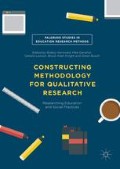Abstract
Black and Busch open a thoughtful dialogue about research with children, research relationships and the status and location of children in research. Particular attention is given to ethical motivations and considerations and children’s visibility in research and broader society. The chapter explores how researcher values and ethical commitments position children, determine their visibility and influence wider cultures of listening to children. The challenges and fruitfulness of research with children are discussed alongside researcher experiences and highlight the importance of ongoing conversations within research communities.
Access this chapter
Tax calculation will be finalised at checkout
Purchases are for personal use only
References
Ben-Ari, A., & Enosh, G. (2013). Power relations and reciprocity: Dialectics of knowledge construction. Qualitative Health Research, 23(3), 422–429. doi:10.1177/1049732312470030.
Bessant, J. (2006). The fixed age rule: Young people, consent and research ethics. Youth Studies Australia, 25, 50–57.
Black, A. L. (2014). Reconceptualising meaning-making and embracing disruptive inquiry. In J. K. Jones (Ed.), Weaving words: Personal and professional transformation through writing as research. UK: Cambridge Scholars Publishing.
Black, A. L., Busch, G., & Hayes, M. (2015). Reducing the marginalization of children: Relational knowledge production and the power of collaboration. In K. Trimmer, A. L. Black, & S. Riddle (Eds.), Mainstreams, margins and the spaces in-between: New possibilities for education research. London: Routledge.
Christensen, P., & James, A. (2008). Research with children: Perspectives and practices. Oxon: Routledge.
Christensen, P., & Prout, A. (2002). Working with ethical symmetry in social research with children. Childhood, 9(4), 477–497.
Clandinin, D. J., Pushor, D., & Orr, A. M. (2007). Navigating sites for narrative inquiry. Journal of Teacher Education, 58(1), 21–35.
Clark, A. (2011). Breaking methodological boundaries? Exploring visual, participatory methods with adults and young children. European Early Childhood Education Research Journal, 19(3), 321–330. doi:10.1080/1350293X.2011.597964.
Cumming, T., Sumsion, J., & Wong, S. (2013). Reading between the lines: An interpretative meta-analysis of ways early childhood educators negotiate discourses and subjectivities informing practice. Contemporary Issues in Early Childhood, 14(3), 223–240.
Danby, S., & Farrell, A. (2004). Accounting for young children’s competence in educational research: New perspectives on research ethics. Australian Educational Researcher, 31(3), 35–50.
Ebrahim, H. (2010). Situated ethics: Possibilities for young children as research participants in the South African context. Early Child Development & Care, 180, 289–298.
Giugni, M. (2011). “Becoming worldly with”: An encounter with the early years learning framework. Contemporary Issues in Early Childhood, 12(1), 11–27.
Harcourt, D., & Einarsdottir, J. (2011). Introducing children’s perspectives and participation in research. European Early Childhood Education Research Journal, 19(3), 301.
Hood, S., Kelley, P., & Mayall, B. (1996). Children as research subjects: A risky enterprise. Children & Society, 10(2), 117–128.
Kellett, M. (2011). Researching with and for children and young people Centre for Children and Young People: Background Briefing Series (Vol. 5). Lismore: Centre for Children and Young People, Southern Cross University.
Lawrence, R. L. (2005). Knowledge construction as contested terrain: Adult learning through artistic expression. New Directions for Adult and Continuing Education, 107, 3–11.
McNamara, P. M. (2013). Giving voice to children and young people in research: Applying rights-based frameworks to meet ethical challenges. Developing Practice: The Child, Youth and Family Work Journal, 37, 55.
Noddings, N. (2012). The caring relation in teaching. Oxford Review of Education, 38(6), 771–781. doi:10.1080/03054985.2012.745047.
Pasque, P. A., Carducci, R., Gildersleeve, R. E., & Kuntz, A. M. (2011). Disrupting the ethical imperatives of “junior” critical qualitative scholars in the era of conservative modernization. Qualitative Inquiry, 17(7), 571–588.
Powell, M. A., Fitzgerald, R., Taylor, N. J., & Graham, A. (2012). International literature review: Ethical issues in undertaking research with children and young people, for the Childwatch International Research Network. Lismore: Southern Cross University; and Dunedin, New Zealand: University of Otago, Centre for Research on Children and Families.
Rhedding-Jones, J. (2005). What is research? Methodological practices and new approaches. Oslo: Universitetsforlaget.
Skelton, T. (2008). Research with children and young people: Exploring the tensions between ethics, competence and participation. Children’s Geographies, 6(1), 21.
Spyrou, S. (2011). The limits of children’s voices: From authenticity to critical, reflexive representation. Childhood: A Global Journal of Child Research, 18(2), 151–165.
Theobald, M. (2012). Video-stimulated accounts: Young children accounting for interactional matters in front of peers. Journal of Early Childhood Research, 10(1), 32–50.
United Nations (1989). United Nations Convention on the Rights of the Child. New York: United Nations.
Waller, T., & Bitou, A. (2011). Research with children: Three challenges for participatory research in early childhood. European Early Childhood Education Research Journal, 19(1), 5–20. doi:10.1080/1350293X.2011.548964.
Author information
Authors and Affiliations
Editor information
Editors and Affiliations
Copyright information
© 2016 The Author(s)
About this chapter
Cite this chapter
Black, A.L., Busch, G. (2016). Understanding and Influencing Research with Children. In: Harreveld, B., Danaher, M., Lawson, C., Knight, B., Busch, G. (eds) Constructing Methodology for Qualitative Research. Palgrave Studies in Education Research Methods. Palgrave Macmillan, London. https://doi.org/10.1057/978-1-137-59943-8_15
Download citation
DOI: https://doi.org/10.1057/978-1-137-59943-8_15
Published:
Publisher Name: Palgrave Macmillan, London
Print ISBN: 978-1-137-59942-1
Online ISBN: 978-1-137-59943-8
eBook Packages: EducationEducation (R0)

